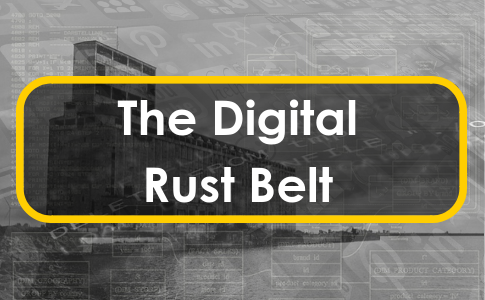The Digital Economy creates jobs, wealth, and drives innovation. Powerful, well-intentioned outsiders are fighting to control its future. Their ignorance of how it works could doom its promise.
As I write this, the news of Amazon’s HQ2(s) announcement is still reverberating in the news and on the street. Tens of thousands of high-paying tech jobs in NYC and DC are the center of gravity for every story, with tax revenue, construction jobs, and infrastructure spend locked in sympathetic orbits. From the outside, it seems that the prospects for tech workers have never been better.
In reality there are deep fault lines spreading in the global digital ecosystem. Careers in software and technology, like the blue collar careers that elevated millions in previous decades, are under threat from forces outside their control. In fact, just like the previous wave of job loss, the threat is largely invisible to those most likely to suffer. The threats come from the outside, both in the United States and in Europe; from bureaucrats, lawyers, policy-makers and well-meaning social activists intent on fixing an ecosystem without considering those that inhabit it. The reality is that internet corporations, entrepreneurs, technologists and developers are interdependent. A threat to one risks cascading crises that could cripple the whole. Today’s innovation requires collaboration, and a healthy market for shared ideas, and effort from many different players.
Software and technology do not spring whole from the minds of each new creator. Today’s innovations are built on top of the work of others. The software development community in particular uses a hugely collaborative and incremental system. Software from millions of creative minds is reworked, recombined, reimagined and then shared inside a global network for others to build on. This “open source” community is the driving force of innovation, and is responsible for the vast array of services and applications you use on your computer, your phone, and all your smart devices.
Open source, and the community behind it, is the foundation for modern software development.
Shared software is not without its challenges or its detractors, however. Innovation requires a delicate balancing of rewards and protections to encourage inventors without empowering thieves. The millions of developers inside the open source community have been rigorous in how they collaborate, collectively balancing the system so that the smallest player can compete against the largest. It’s a highly dynamic and informal society with rules and norms tested over time. Open source development is how millions of small developers are changing the world, creating jobs, and driving positive societal change. Around the world, some of today’s most successful companies have their roots in this collaborative and open environment.
All of which stands balanced like a house of cards in a rising wind.
In the rush to vilify and tame the giants of the digital economy, forces outside the system are searching for ways to reset the balance. Instead of delicate changes, the focus has been to find areas of maximum leverage to minimize the effort of driving big change. This is the lazy man’s approach, and it is being applied with little finesse and too much urgency. It risks the creation of a digital rustbelt and the loss of the engine that powers today’s innovation economy.
Software developers around the world are under threat because the ecosystem they rely on is under threat. But what is critically important is that it is not the nature of the threats that developers fear, but the ham-handed attempts at addressing them by well-meaning intervenors. The digital ecosystem must evolve with the times, but throwing a wrench into its delicate works is not the way to do it. The physician’s counsel – first, do no harm – would not be out of place in guiding the hands of regulators and jurists. Developers are potential collateral damage in a clash of titans.
Technology workers are not organized, they have no union, they have no super-PAC, and yet they are the most critical component in the digital economy. In a news cycle where we celebrate and debate the jobs that the digital economy is planting on the east coast, we’d do well to think far less about the one company, or five, whose name is on the buildings, and far more about the 50,000 soon-to-be-employed whose names really matter. If the politicians and power players around us would make that one simple shift, a million tech workers in the U.S. and in Europe would gladly agree their prospects are looking up.




